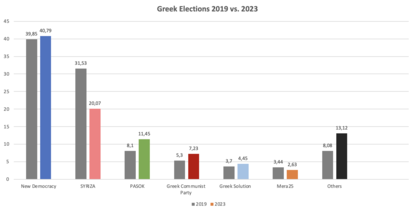Greek
Greek national elections bring surprising results with shifting political landscape

The Greek national elections on May 21st left the country in awe as the political landscape shifted unexpectedly. Five parties exceeded the 3% threshold required for parliamentary representation: New Democracy (40.79%), SYRIZA (20.07%), PASOK (11.45%), the Greek Communist Party (7.23%) and Greek Solution (4.45%). At the same time, three smaller political parties came close to exceeding it, but fell short, with Mera25, led by Yianis Varoufakis, being one of them.
The outcome has sparked a significant surprise, with implications for the main opposition party (SYRIZA) and its relevance in the political landscape, since it seems to have lost trust among the voters, raising questions regarding the dynamics of the opposition in general, after the significant rise of PASOK.
Political shifts
The largest surprise of the elections was the substantial 20% disparity between the winning and the second party, which surprised both political observers and the general public. New Democracy and its leader Kyriakos Mitsotakis, saw an unforeseen spike of support. However, this support was insufficient to win a legislative majority, despite indicating that ND is highly likely to secure a second tenure in the second round of the elections.
In contrast, the opposition party of SYRIZA and Alexis Tsipras suffered an unexpected blow, forcing the party to reevaluate its place in the political landscape while also raising questions about the party's leadership. As the main political message of the pre-election period, opposing Kyriakos Mitsotakis personally, did not produce the expected results, the party now confronts the challenge of redefining its purpose and strategy moving forward.
One of the most notable developments in the elections was also the remarkable rise of PASOK, which managed to elevate its vote share to reach double digits. This boost for PASOK also raised questions about the dynamics within the opposition bloc. As they continue to gain momentum the party may emerge as a viable challenger to SYRIZA's status as the dominant opposition force in Greek politics, which is their main goal for the second round.
Greece now finds itself on the path to a second round of elections, which most likely will take place earlier than planned, on June 25th, since no coalition was formed. In the meantime, the first round results reflect a clear message from the Greek electorate: the support garnered by New Democracy underscores the success of their policies in revitalizing the country's economy and driving the long-overdue digitization of Greece's administration, despite the negative political developments that have taken place during the last 4 years, but most importantly they indicate a loss of trust in SYRIZA, as it does not appear to be a viable alternative for the electorate. Does SYRIZA have the reflexes required to shift these results within a month?

